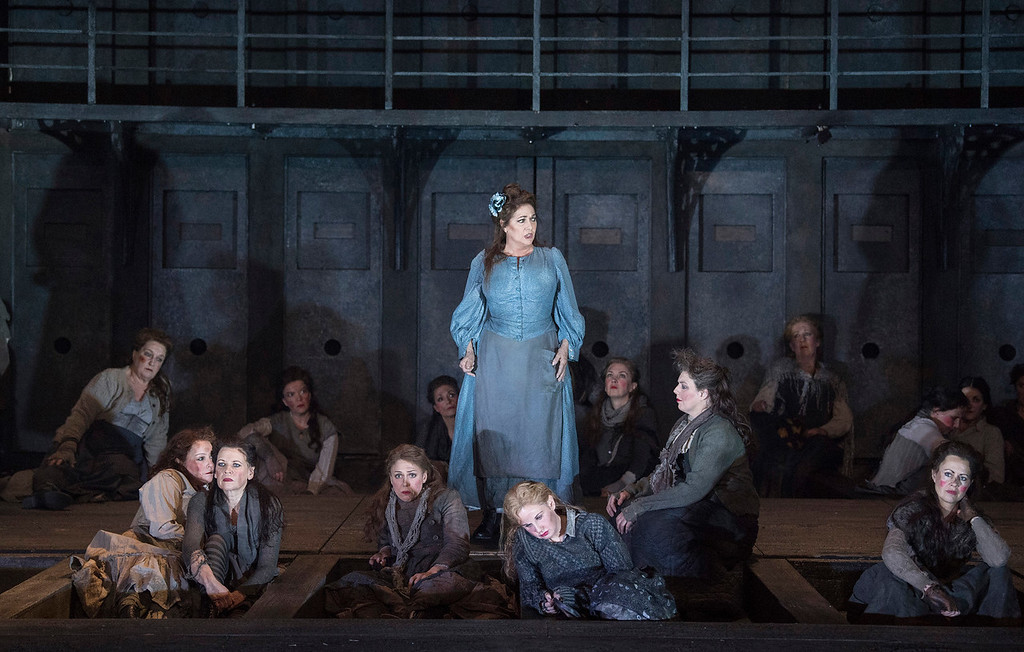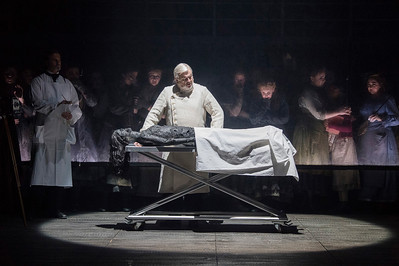London Coliseum, Friday 12 April 2019
Iain Bell has a distinctive voice as a composer. His WNO opera In Parenthesis was one of the most impressive new works I have encountered in a very long time. It was also a superb piece of theatre, combining the mystical with the stark reality of the trenches. If this seems a strange way to start a review of ENO’s new Jack the Ripper; The Women of Whitechapel it is that, while I have no doubts about Iain Bell as a composer, I have serious reservations about the dramatic impact, or lack of it, of the new work. To take a pro-feminist approach to the myths surrounding Jack the Ripper makes good sense but Emma Jenkins libretto fails to create female characters with whom we can empathise or really engage. The first murder is of a woman we have never encountered, and the death of Polly makes little more impact as we have had virtually no emotional engagement with her.
The problem is made all the more obvious with the characterisation of the men. Alan Opie’s Pathologist comes across as a rounded and significant human being as does Alex Otterburn’s delightful Squibby. By contrast we gather virtually no sense of individuality from the women who live in the doss house. Only Josephine Barstow’s magnificent Maud brings us anywhere near a credible and identifiably strong woman. (and it seems impossible that I first saw her as Violetta in 1968!)
The approach seems to be caught between wanting to show us the drab reality of doss house living and the everyday reality of prostitution and abuse, and the need for opera to work on a heightened level which will quickly engage with us. To take a few examples. In Peter Grimes Britten gives remarkably little time to Aunties nieces but they stick in the mind as real people. Their from the gutter immediately pin-points the reality of their life in an unsentimental but very moving way.
Similarly Phyllis Tate’s The Lodger gives us a gutsy pub chorus which I still recall even though I only saw the work once many years ago.
There is no need for Jack the Ripper to appear but any work based on the myths needs to have a strong narrative and stark reality which this new opera simply side-steps. Put bluntly, for all that we should care about the women in the doss house, by the interval we don’t. Yet this is not in any way the fault of the excellent cast. Beside Dame Josephine Barstow the women are sung by Natalya Romaniw, Janis Kelly, Marie McLaughlin, Susan Bullock and Leslie Garrett, any one of whom could potentially attract an audience in their own right. Yet the opportunity is missed to allow them to carve out a space for themselves. Arias for individuals could have gone some way to help this but the ones they are given lack the bite and individuality to sear them in our minds.
In terms of dramatic impact one has only to think of Janacek’s House of the Dead to realise what potential there could be here and what, ultimately, was missed.
The setting by Soutra Gilmour is suitably oppressive and this has to be one of the most sensitive productions Daniel Kramer has provided for ENO to date. Martyn Brabbins handles the large forces sensitively but in many ways he is not given a lot to do.
I wish I could be more enthusiastic. I want to be, as there was so much here that was on the cusp of being superb but it never tipped over into the frisson of excitement and excellence which the combined forces had led us to anticipate.
Maybe there is a concert suite lurking within the work which could rescue the many splendid passages – or maybe we could persuade ENO to mount In Parenthesis which is a greater work on all levels.


